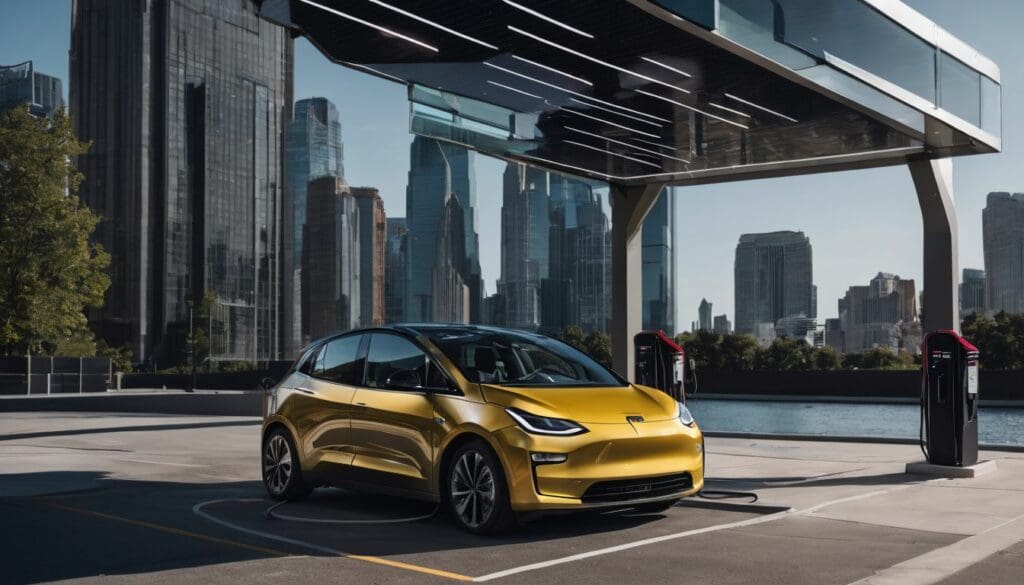As we all yearn for a bit of green in our getabouts, the burning question on many minds is whether electric vehicles can indeed shepherd us into a sustainable future. We’ve been pondering this ourselves and have noticed that there’s quite the buzz around electric car sales—they’re absolutely booming worldwide.
Our deep dive into this topic has illuminated how this surge in EV popularity might just set us on course towards an eco-friendly existence where travel doesn’t leave its mark so heavily upon dear old Mother Earth.
So why not join us as we venture into the sparkling world of zero-emissions travel? It could very well be high time to give your daily journey a jolt of clean energy—let’s embark on this enlightening expedition together!
Key Takeaways
- The electric vehicle market is expanding rapidly, with sales climbing each year due to increased environmental consciousness and advances in technology.
- Governments worldwide are supporting the transition to sustainable transportation through incentives, aiming to make electric vehicles more accessible and affordable for consumers.
- Technology advancements are key to the future of electric vehicles, with a focus on improving battery life, energy efficiency, and overall vehicle performance.
- Despite their growth in popularity, electric vehicles face challenges like higher upfront costs and limited charging infrastructure which need to be addressed for broader adoption.
- Electric cars are crucial for sustainable transport as they offer substantial benefits such as lower greenhouse gas emissions compared with traditional gasoline-powered vehicles.
The Current State of Electric Vehicles
The electric vehicle market is rapidly growing, with sales increasing each year. This growth is impacting traditional vehicles and presenting a shift towards sustainable transportation.
Overview of electric vehicle market
Electric cars are changing the game in sustainable transport. We’re seeing a surge in the electric vehicle market, driven by our growing environmental awareness and technological breakthroughs.
With innovative designs and improved battery life, these green machines are starting to rival their petrol-guzzling counterparts. Sales numbers are soaring as more of us opt for cleaner rides that reduce carbon emissions.
Governments around the world have taken notice, rolling out incentives to make EVs more attractive to consumers. This is revving up demand and pushing car manufacturers into a new era of vehicle production.
As passionate gamers appreciate cutting-edge tech, we can’t help but get excited about this rapid evolution taking place right on our streets – it’s like watching high scores being shattered in real time! The global auto industry is at a pivotal point, with electrification set to slash millions of barrels of oil consumption as clean technology takes over.
Growth in sales
The electric car market has seen a remarkable surge in sales, with forecasts predicting an exponential increase in the adoption of electric vehicles globally. With technological advancements and increasing consumer demand, the industry is experiencing rapid growth, aligning with government incentives promoting sustainable transportation options.
The future looks promising as more individuals and organisations are turning towards battery-powered electric cars for their environmental benefits and energy efficiency. Moreover, global initiatives to reduce carbon emissions are driving the transition towards greener transportation options, further boosting the growth in sales of electric vehicles.
Electric vehicle manufacturers have been witnessing a substantial rise in demand for sustainable transport solutions. This trend showcases a significant shift towards environmentally friendly modes of transportation and highlights society’s growing awareness of carbon emissions reduction.
Impact on traditional vehicles
Electric vehicles are significantly impacting traditional vehicles as the market experiences exponential growth in sales. This shift is leading to a reduction in the need for oil, making a notable impact on the global auto industry.
The Biden-Harris administration’s investment in clean energy and manufacturing further accelerates this transformation, emphasising the growing dominance of battery-powered electric cars over traditional fuel-based vehicles.
The increasing adoption of electric vehicles drives home the importance of sustainable transportation and underscores the environmental benefits that come with it. With forecasts pointing towards a significant increase in electric car usage globally, traditional vehicle manufacturers face mounting pressure to adapt to this rapidly evolving landscape.
Benefits of Electric Vehicles
Electric vehicles offer a reduction in greenhouse gas emissions, lower operating costs, and improved energy efficiency. These benefits contribute to a greener transportation future and a more sustainable environment.
Reduction of greenhouse gas emissions
Electric vehicles produce zero tailpipe emissions, reducing the release of greenhouse gases into the atmosphere. As they run on electricity rather than petrol, their use contributes to cleaner air and helps combat climate change.
With a rechargeable battery powering these vehicles, they offer a greener transport option that aligns with the global push towards renewable energy sources.
The growth in electric vehicle adoption is expected to significantly contribute to sustainability by decreasing the carbon footprint associated with traditional petrol-powered cars.
Lower operating costs
Electric vehicles offer an appealing advantage with their lower operating costs. Compared to traditional gasoline vehicles, electric cars require less maintenance due to fewer moving parts and no need for oil changes.
With the growing infrastructure for charging stations, EV owners can benefit from reduced fuel expenses and even take advantage of off-peak charging rates, contributing to overall savings.
Furthermore, as technology advances and battery prices decline, the cost of owning an electric vehicle is expected to become increasingly competitive with conventional cars over time.
As we delve into the environmental impact of electric vehicles in more detail, it’s crucial to consider not only lower operating costs but also long-term sustainability and energy efficiency as key factors driving this transportation revolution.
Improved energy efficiency
Electric vehicles have significantly improved energy efficiency compared to traditional internal combustion engine cars. Electric cars can convert over 77% of the electrical energy from the grid to power at the wheels, while conventional vehicles only convert about 12-30% of the energy from gasoline to power.
This makes electric vehicles more environmentally friendly and cost-effective in the long run. The higher efficiency means that fewer natural resources are needed for electricity production and less strain is placed on the power grid, making them a sustainable transportation option.
Furthermore, due to this improved efficiency, electric vehicles have lower operating costs than traditional vehicles since they require less fuel or electricity to cover the same distance as an internal combustion engine vehicle would with petrol.
Challenges to Widespread Adoption
Despite the promising growth in the electric vehicle market, challenges such as limited infrastructure and higher upfront costs still pose barriers to widespread adoption. To learn more about these challenges and how they impact the future of sustainable transportation, keep reading!
Limited infrastructure
Electric vehicle infrastructure faces challenges due to limited charging stations and power grid strain. As electric car adoption rates surge, ensuring adequate infrastructure becomes critical to support the growing demand for charging facilities.
The strain on the power grid suggests a need for upgrades and advancements in energy distribution systems to accommodate the increasing number of electric vehicles. This poses implications for the energy sector, highlighting the necessity of addressing infrastructure limitations to facilitate widespread adoption of green vehicles.
The global shift towards alternative fuels and sustainable transportation necessitates proactive measures in expanding electric vehicle infrastructure. Investing in charging networks and enhancing power grid capacity are essential steps that align with future projections of increased EV adoption rates.
Higher upfront cost
Expanding electric vehicle adoption presents a significant hurdle due to the higher upfront cost associated with these vehicles. The investment required is notably more than traditional gasoline-powered cars, primarily because of the advanced technology and materials needed for electric vehicle production.
However, government incentives and rebates aim to alleviate this financial burden for potential buyers, making it essential for consumers to explore available subsidies. Manufacturers are continuously working towards reducing production costs, which may eventually lead to more competitive pricing in the electric vehicle market.
Despite the higher initial expenses compared to conventional vehicles, long-term benefits such as lower operating costs and reduced environmental impact make electric vehicles an attractive option for drivers seeking sustainable transportation solutions.
Dependency on battery technology
Electric vehicles are reliant on the advancement of battery technology to improve energy storage capacity and reduce costs. Innovations in battery tech will be pivotal for increasing electric car range, delivering better performance, and making them more affordable for consumers.
This is essential as the industry looks to scale up electric vehicle production and meet future demand while reducing reliance on fossil fuels. The development of sustainable and efficient battery technology holds the key to driving widespread adoption of electric vehicles by addressing concerns around environmental impact, mining sustainability, and power source dependence.
Government and Industry Initiatives
The government and industry are working together to set goals for electric vehicle adoption and provide incentives and support to encourage the switch from traditional vehicles. Partnership and collaboration between the public and private sectors are essential in driving the widespread adoption of electric vehicles.
Goals for electric vehicle adoption
The government has set ambitious goals for electric vehicle adoption to reduce greenhouse gas emissions and promote sustainable transportation.
Incentives and support
The government and various industries worldwide are providing incentives and support to promote the adoption of electric vehicles. These initiatives aim to accelerate the transition towards sustainable transportation and reduce greenhouse gas emissions. Here are some detailed examples of incentives and support for electric vehicle adoption:
- Government subsidies and tax credits for purchasing electric vehicles, reducing the upfront cost for consumers while driving sales growth.
- Investment in infrastructure development, such as expanding the network of charging stations to alleviate range anxiety among electric vehicle drivers.
- Partnerships between governments and private sectors to advance research and development in battery technology, aiming to improve energy storage capacity and reduce dependence on fossil fuels.
Partnership and collaboration
To further accelerate the growth of electric vehicles, partnerships and collaboration between different sectors are pivotal. Industries like technology, energy, and automotive need to work together to enhance infrastructure, battery technologies, and charging stations.
By forming alliances with governments and private entities, the electric vehicle market can benefit from policy support, funding initiatives, and research advancements. Collaboration will be instrumental in overcoming challenges such as limited infrastructure and reducing upfront costs for consumers.
These strategic partnerships will shape a sustainable transportation future by driving innovation across various sectors.
Future of Electric Vehicles
The future of electric vehicles looks promising, with expected growth in sales and continuous technological advancements. Electric vehicles are set to play a crucial role in achieving sustainable transportation for the future.
Expected growth in sales
The electric car market is expected to witness significant growth in sales, with forecasts and predictions indicating a surge in the percentage of electric cars globally. Factors such as government incentives, consumer demand, and technological advancements are driving this anticipated expansion.
With the Biden-Harris administration’s investment in clean energy and manufacturing, the acceleration of electric vehicle production is set to propel the expected growth even further.
As electrification continues to reduce the need for oil by millions of barrels, the future of transportation appears increasingly inclined towards battery-powered electric vehicles, marking a remarkable shift within the global auto industry.
Moreover, as concerns about environmental sustainability continue to gain momentum, electric vehicles are being recognised as a progressive choice for sustainable transportation. The benefits extend beyond reduced greenhouse gas emissions to encompass lower operating costs and improved energy efficiency.
Technological advancements
Technological advancements in the electric vehicle industry are rapidly shaping the future of transportation. Innovations such as improved battery technology, more efficient charging infrastructure, and enhancements in vehicle design continue to push the boundaries of what electric vehicles can achieve.
These advancements not only contribute to increased energy efficiency and longer driving ranges but also make electric cars more accessible and appealing for consumers. Moreover, the integration of advanced connectivity features and autonomous driving capabilities is redefining the overall driving experience, offering a glimpse into the exciting possibilities that lie ahead for sustainable transportation.
The growing impact of technological advancements on electric vehicles signifies a shift towards cleaner energy usage in the transport sector. With ongoing research and development efforts focusing on enhancing performance, reducing costs, and minimising environmental footprint, electric vehicles are poised to play a crucial role in achieving a sustainable transportation future.
Role in achieving sustainable transportation
Electric vehicles play a crucial role in achieving sustainable transportation by reducing greenhouse gas emissions and dependence on fossil fuels. They contribute to cleaner air quality and lower carbon footprints, making them an environmentally friendly alternative.
Additionally, the shift towards electric vehicles aligns with global efforts to combat climate change and promote energy efficiency in the transportation sector. As part of our commitment to a greener future, we must embrace the widespread adoption of electric vehicles as a fundamental step towards sustainable transportation solutions.
The continued growth of electric vehicle market reinforces the potential for broader integration into society. This trend indicates positive strides toward a more sustainable transportation landscape that prioritises energy-efficient and eco-friendly mobility options.
Conclusion
In conclusion, the electric vehicle market is experiencing unprecedented growth, driven by factors such as government incentives and technological advancements. The shift towards battery-powered electric cars signals a significant transformation in the global auto industry, with implications for reduced oil dependency and greenhouse gas emissions.
With ongoing investments in clean energy and manufacturing, we are undoubtedly on the road to a more sustainable transportation future. As electric vehicle adoption continues to rise, it’s crucial to address concerns about mining for batteries and reliance on fossil fuels while recognising the environmental benefits of this shift.
FAQs
1. What is the electric vehicle boom?
The electric vehicle boom refers to the rapid growth in the electric vehicle market, as more people are choosing cars powered by electricity over traditional fuel.
2. Why are electric vehicles important for sustainability?
Electric vehicles are important for sustainability because they use clean energy, which can reduce pollution and our reliance on fossil fuels.
3. Will this increase in electric vehicles affect other areas like energy?
Yes, with more electric vehicles on the road, there will be big changes in the energy sector regarding how we generate and distribute power.
4. Can we expect a sustainable transportation future from this trend?
The growing popularity of electric vehicles is an encouraging sign towards a sustainable transportation future where travel depends less on harmful emissions.





